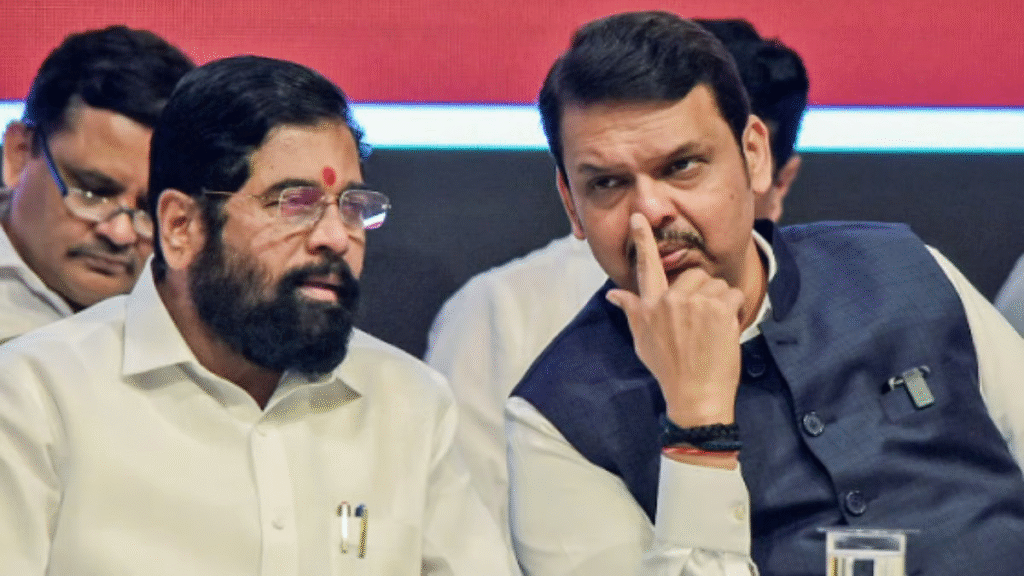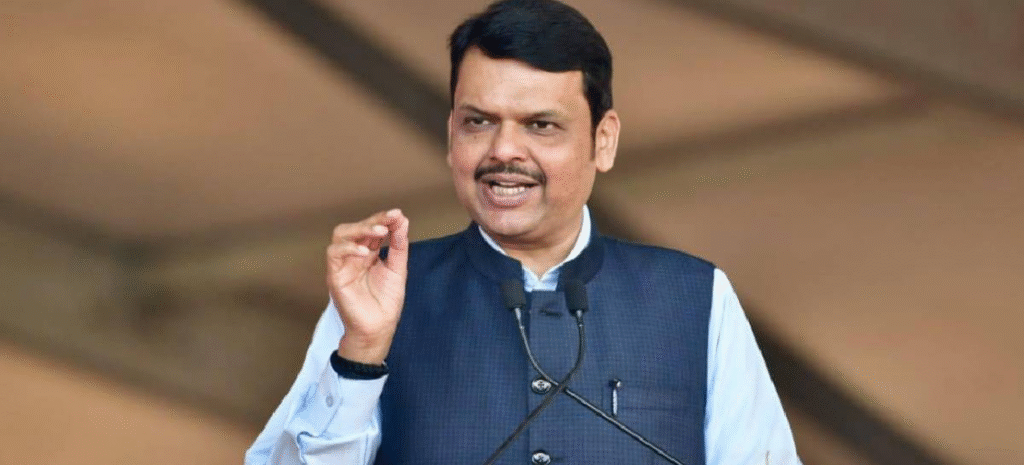‘Jai Gujarat’ Hit Harder Than Expected — Maharashtra Politics in Flames.

In the Recent Political Discourse, the moment when the Deputy CM of Maharastra Eknath Shinde uttered the words, ‘Jai Hind, Jai Maharashtra, Jai Gujarat’ in Presence of Central Home Minister Amit Shah who was attending the inauguration of the Jairaj Sports and Convention Centre in Pune’s Kondhwa, organized by the Shree Poona Gujarati Bandhu Samaj, on July 4, 2025. What was supposed to be a display of unity, rapidly became the so-called issue Gujarati appeasement against the Pride of a Marathi men. The words, ‘Jai Gujarat’ weren’t seen as words of courtesy but were painted as Code, which in the Maharashtra’s Political Theatre deciphered not as National Integrity but as a red flag.
In a rare twist of Fate, The Marathi pride of a Balkanised Thackeray familyー Uddhav Thackery OF UBT Shiv Sena and Raj Thackery of Maharashtra Navnirman Sena, both known for their sharp defence of Marathi identity, erupted in thunder. The once Divided Cousinsー Found themselves on the Same Side of this rhetoric. This Not only created a core issue in Maharashtrian Politics but united the two Poles of the Thackeray Family. The outburst is not about the policy — it was about perception. Perception of Marathi Linguistic Crisis.
The Only thing is this Political antic is relatively new in Maharashtra’s Political Arena.
Despite having no Political predicament regarding the ‘Hindi Imposition’, This new development wasn’t born in a Power Vacuum, Maharashtra’s sudden linguistic sensitivity comes from the DMK’s hyper-regional linguistic politics — where language isn’t just communication, it’s cultural weaponry.
But how this ‘Politics of Language’ Became the Political TNT, to understand that we need to Understand the Insecurities and Greediness of how this ‘Politics of Language’ has outgrown its ideological applications.
Marathi Pride or Political Theatre? Between Real Sentiment and Political Stunt.
To the Marathi Linguistic Politics Comes a wide range of reaction and Commentary. A video by the Handle @MumbaichaDon on X was Shared with the Commentary which highlights a critical issue within the Maharashtra Navnirman Sena’s So-Called guards of the Marathi Culture.
Reporter to MNS Karyakarta~
— BhikuMhatre (@MumbaichaDon) July 5, 2025
Which day is Marathi Language Day?... त त प प
Maharashtra Day?... त त प प
First Marathi novel?... त त प प
First Marathi poem?... त त प प
But still Raj Thackeray is proud Marathi & so are his Karyakartas who have license to beat Non-Marathi HINDUS. pic.twitter.com/wJPvpKLiFS
A MNS Karyakarta Struggles to answer questions about Marathi culture, despite from a party who advocates for Marathi pride. This Lack of Fundamental knowledge Such as Date of Marathi Language Day, Date of Establishment of Maharashtra as State. This Exposure undermines the Credibility of MNS’ claim for language promotion and further hampers it with Violent Enforcement against Non-Marathi Speaking Individuals.
Another Reaction From Rajdeep Sardesai to this incident underscores the irony and hypocrisy within MNS’s actions.
Friday column: Amit Shah detests English; Shiv Sena/MNS wants Marathi first; MK Stalin doesn’t want Hindi ‘imposed’. Will re-igniting language ‘wars’ work in a ‘new’ India? Read here: feedback welcome. https://t.co/mX0aqLFsBG
— Rajdeep Sardesai (@sardesairajdeep) July 4, 2025
Sardesai amplifies the narrative that MNS karyakartas, who are quick to demand Marathi proficiency from others, often lack a deep understanding of their own language and history.
Adding Layer to this Discourse, Handles like @zoo_bear commented about the potential Repercussion if Such politics had the first say which Grows into language-based aggression on a larger scale and influence during National and International Events
Maharashtra Navnirman Sena (MNS) members got involved in the dispute with housing society residents after allegations surfaced that Marathi-speaking neighbours were insulted for consuming non-vegetarian food. https://t.co/msuVlVAdYK
— Mohammed Zubair (@zoo_bear) April 18, 2025
In Ajeet Bharati’s Observation usage Marathi language and culture is nothing more than a political tool rather than genuinely promoting it.
महाराष्ट्र के मंत्री हैं, @Dev_Fadnavis की कैबिनेट में। ‘इन्फ्रामैन’ से चालू हो कर कहाँ जा रही है इनकी छवि? कौन से कानून में लिखा है कि मराठी बोलना है, और न बोला तो केस होगा? राज ठाकरे के गुंडों के सामने लाचार है ये सरकार। इतनी मेजोरिटी का क्या फायदा? pic.twitter.com/MlNmiSecvM
— Ajeet Bharti (@ajeetbharti) July 3, 2025
While @theskindoctor13’s reaction, Focused on suggestive to the need of Accountability.
MNS goons vandalized a Mumbai businessman’s office after he tweeted that he wouldn’t learn Marathi.
— THE SKIN DOCTOR (@theskindoctor13) July 5, 2025
In a civilized country, you could legally shoot them citing imminent danger or call the cops, who’d arrive in minutes and they face a certain jail for upto 20 yrs.
But India is a… pic.twitter.com/MW7gU25QnJ
In this instance Businessman Sushil Kedia Challenged Raj Thackeray That he will not Speak marathi
Do note @RajThackeray I dont know Marathi properly even after living for 30 years in Mumbai & with your gross misconduct I ahve made it a resolve that until such people as you are allowed to pretend to be taking care of Marathi Manus I take pratigya I wont learn Marathi. Kya…
— Sushil Kedia (@sushilkedia) July 3, 2025
The Hooglism that followed after it was Justified by the MNS leaders.
He also shoot warning though at Sushil Kedia, this also served as a Advisory to all.
बेपारी आहात बेपार करा,आमचे बाप बनण्याचा प्रयत्न करू नका.महाराष्ट्रात मराठीचा अपमान कराल तर कानाखालीच बसेल बाकी मेहता बिहता नी चड्डीत राहायचं.तूर्तास एव्हढाच
— Sandeep Deshpande (@SandeepDadarMNS) July 4, 2025
In the State that is much celebrated for its Literary Legacy and Vibrat theatre, the ‘Politics of Language’ has dangerously shifted the focus from Cultural celebration to Coercive Assertion. While the So called Soldiers of Marathi pride might claim to do it all in the name of defending the Culture and language, The Shallowness of their own Knowledge and Enforcement tactics make this all a Elaborate spectacle of intimidation in the name of Linguistic preservation.
The Origin of Linguistic Hostility— How It All Began

Even before India attained its freedom, Periyar E.V. Ramasamy laid the foundation of language politics in Tamil Nadu by fiercely opposing the imposition of Hindi, which he perceived as a symbol of North Indian and Brahminical domination. He championed Tamil as central to Dravidian identity and self-respect, arguing that linguistic pride was essential for community progress and autonomy.
Periyar’s Dravid Ideology viewed Tamil, Telugu, Malayalam, and Kannada as sister languages of a common Dravidian origin and deliberately crafted a narrative that positioned Tamil and Hindi as adversaries, creating a lasting rift between the two languages. In his bid to assert Dravidian identity and resist what he saw as North Indian hegemony, he didn’t merely oppose the imposition of Hindi—he vilified it as a symbol of cultural domination. This wasn’t just about linguistic preference; Periyar framed the very existence of Hindi in Tamil Nadu as a threat to Tamil pride and survival. By equating Hindi with Brahminism, North Indian control, and systemic oppression, he polarized the linguistic landscape, forcing people to choose sides rather than seek coexistence.
This led to Periyar’s criticism of Tamil’s archaic forms, calling for its purification from Sanskrit influences and modernization, his intent was to create an emotional and political battleline in what could have been a debate about the language policy. This fueled language-based agitations, and institutionalized a cultural divide that persists in Indian politics and society even today.
After independence, the question of India’s language policy sparked intense debate. While many from the Hindi-speaking North advocated for Hindi to be declared the national language, leaders from South and East India strongly opposed the move. They feared that imposing Hindi would marginalize non-Hindi speakers and endanger India’s rich linguistic diversity. The Constituent Assembly witnessed heated arguments, with some even warning of secession if Hindi was enforced. Ultimately, a compromise was reached: Hindi in Devanagari script would be the official language of the Union, not the “national language,” and English would continue as an associate official language for 15 years.
This linguistic compromise was codified in Articles 343 to 351 of the Constitution, allowing states the autonomy to use their regional languages for governance. However, when the 15-year transition period ended in 1965, mass protests erupted, especially in Tamil Nadu, against the move to make Hindi the sole official language. The central government had to backtrack, and English remained in use alongside Hindi indefinitely. This dual-language model remains in place today, reflecting both the aspirations for national unity and the need to respect India’s vast linguistic plurality.
How NEP 2020 Unleashed a New Age of Language Wars
Modern Politics Surrounding the So-Called ‘Hindi-Imposition’ started with Three-Language Formula in the National Education Policy (2020), Which DMK labelled as disallowance of Local Language and here in this instance was Tamil.
This Ideological Application doesn’t limit itself to the Speeches of Politicians and Textbooks but the very existence of Dravid identity hangs on Antagonising Hindi. The party continues to use the fear of “Hindi imposition” as a political weapon, warning that any coercion from the Centre could trigger another identity crisis for the ‘Tamil Language’.
This ‘Politics of Language’, Even as the Critics of DMK see it as something that perpetuates division, has been Favorable for Electoral Gain. This is also something that is Translating to Different States.
If we look at Karnataka it is only recent that instances of Anti-hindi Imposition are heard of. Pro Kannada groups are vigorously campaigning against the Perceived imposition of Hindi since the Centre’s push in the NEP. This has triggered Aggregated Protests and demonstrations such as Defacing or removing text in Hindi. These groups call it a threat to their linguistic identity.
Inside Maharastra with People who take Soaking pride in their Linguistic Identity, The Thackerays, using the DMK-Blueprint, create a front against the Mahayuti Alliance. Several Episodes of Anti-hindi Acts have surfaced which have drawn a lot of Criticism.
While the Political front is for exhibition for all- People have split Reactions on how this Political Antic has played out.
For those who are ‘For’ Anti Imposition, have called out Mahayuti, Saying- Did Amit Shah Spoke Marathi, There is no Pride in Eknath Shinde, Calling it a Betrayal of Maharashtrian people.
And Yet the Voices of the ‘Against’ Anti Imposition have called out saying that at one point of time the Sharad Pawar has cried out, ‘Jai Karnataka’ Even the Father-son Uddhav and Aditya Thackery have in rallies Shouted the ‘Jai’ of Gujarat and Uttar Pradesh. While many people don’t see anything hurtful to the Linguistic and Cultural identity of Maharashtra in ‘Jai Gujarat’ People surely made out the point that, it is not like Gujarat is some enemy state and Better than saying ‘Pakistan Zindabad’.
While this Political Fallout is so widespread now that in Uttar Pradesh, Locals are targeting those Migrants who came from Maharashtra and Southern Parts- Especially from Maharashtra where in a form of Political Retaliation People are forcing those migrants to Speak- Bhojpuri, not even Hindi.
Language Is Culture, Not a Weapon — All Deserve Respect, Not Political Hijack

In order to characterise the Problem the core matter is ‘When in Rome, Speak Latin.’ The States have the right that The language of their state should be at the forefront of Development, of administration and of Cultural Identity.
In Reality the alternative to this kind of Politics is simple. Be Respectful to the language of the state you are in. Even if you do not speak it, try to understand it which then rather than turning languages into tools of Political Gratification becomes much more meaningful. This is a personal Responsibility of an Individual to learn and Respect the Local Language and in turn it is the responsibility of the locals to teach the language they take pride in with Respect and with a sense of Civic Duty.
Because the Sense of Cultural respect and Linguistic comes from Embracing not from The Enforcement, which itself becomes a form of Imposition. So to function, Indians moving between states should show the same respect — whether it’s Kannada in Karnataka, Tamil in Tamil Nadu, or Marathi in Maharashtra. It bridges gaps, not widens them.




















